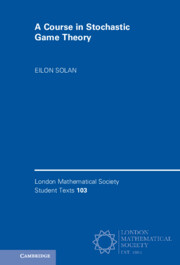
-
Select format
-
- Publisher:
- Cambridge University Press
- Publication date:
- May 2022
- May 2022
- ISBN:
- 9781009029704
- 9781316516331
- 9781009014793
- Dimensions:
- (229 x 152 mm)
- Weight & Pages:
- 0.57kg, 278 Pages
- Dimensions:
- (229 x 152 mm)
- Weight & Pages:
- 0.43kg, 280 Pages
- Subjects:
- Mathematics (general), Economics, Mathematics, Microeconomics, Optimisation
- Series:
- London Mathematical Society Student Texts (103)
You may already have access via personal or institutional login- Subjects:
- Mathematics (general), Economics, Mathematics, Microeconomics, Optimisation
- Series:
- London Mathematical Society Student Texts (103)
Book description
Stochastic games have an element of chance: the state of the next round is determined probabilistically depending upon players' actions and the current state. Successful players need to balance the need for short-term payoffs while ensuring future opportunities remain high. The various techniques needed to analyze these often highly non-trivial games are a showcase of attractive mathematics, including methods from probability, differential equations, algebra, and combinatorics. This book presents a course on the theory of stochastic games going from the basics through to topics of modern research, focusing on conceptual clarity over complete generality. Each of its chapters introduces a new mathematical tool – including contracting mappings, semi-algebraic sets, infinite orbits, and Ramsey's theorem, among others – before discussing the game-theoretic results they can be used to obtain. The author assumes no more than a basic undergraduate curriculum and illustrates the theory with numerous examples and exercises, with solutions available online.
Reviews
‘The book presents a course on the theory of stochastic games. It is self-contained and accessible at an undergraduate level. Instead of seeking the most general results and the broadest spectrum of knowledge in the field, the author prefers firstly to focus with great care on the most central aspects of the theory and then analyses more specifically some particular classes of stochastic games.’
Catherine Rainer Source: zbMATH
Contents
Metrics
Altmetric attention score
Full text views
Full text views help Loading metrics...
Loading metrics...
* Views captured on Cambridge Core between #date#. This data will be updated every 24 hours.
Usage data cannot currently be displayed.
Accessibility standard: Unknown
Why this information is here
This section outlines the accessibility features of this content - including support for screen readers, full keyboard navigation and high-contrast display options. This may not be relevant for you.
Accessibility Information
Accessibility compliance for the PDF of this book is currently unknown and may be updated in the future.


